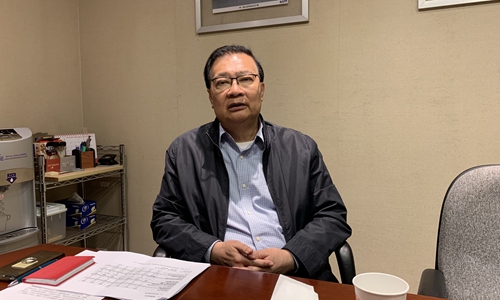HOME >> CHINA
‘One country, two systems’ still starting point for HK work
By Chen Qingqing and Bai Yunyi in Hong Kong Source:Global Times Published: 2019/11/26 22:43:41

Tam Yiu-chung, former chairman of the Democratic Alliance for the Betterment and Progress of Hong Kong, talks with the Global Times on Monday in Hong Kong. Photo: Chen Qingqing/GT
The Hong Kong Special Administrative Region (HKSAR) should tackle all the issues in line with the "one country, two systems" principle in future and the so-called "victory for democracy" was just a slogan, Tam Yiu-chung, former chairman of the Democratic Alliance for the Betterment and Progress of Hong Kong, told the Global Times.
The pan-democrats scored a big win in the 2019 Hong Kong District Council elections on Sunday, with 388 seats against the 63 of the pro-establishment camp. They took control of 17 of the city's 18 district councils.
Months of social unrest triggered by the now-withdrawn extradition bill made the elections highly politicized. However, district council elections aim to select district members to serve communities.
"Hong Kong is not a sovereign country. There's no such saying of de facto referendum for Hong Kong people," Tam said.
"The 'one country, two systems' principle should also remain the starting point of all practical work," he said.
Considering the situation, Tam concluded many Hong Kong people have not shaped a full-scale and objective perspective concerning the principle, as they wrongly consider Hong Kong affairs have nothing to do with the mainland.
"HKSAR government, along with all the sectors of the society, needs to work this out," he said.
Most of the newly registered voters are young, who are also supporters of the pan-democratic parties, he noted.
Tam suggested that HKSAR government should continue pushing forward the Chinese national education curriculum to promote understanding of "one country, two systems" from a larger context while in a more flexible and smart way by evaluating public opinion.
While pan-democratic groups scored a landslide victory, a tough political battle between pan-democratic and pro-establishment camps will loom, the former chairman noted.
Street violence will cool as long as opposition groups hold rational views on the battle, Tam said.
"However, the pan-democratic groups could not control all the radicals. Violence and vandalism may occur again on the streets," he said.
A large number of voters came out to vote on Sunday, perhaps not only to select a preferred candidate to sit on the district council but also to express a view on many social issues, Carrie Lam Cheng Yuet-ngor, Hong Kong chief executive, said during a press conference on Tuesday.
Many expressed their dissatisfaction with the government and such dissatisfaction was also reflected in the vote for the pro-establishment group which supports the government's policies, observers said.
Tam said the election took place in an abnormal environment.
"Harassment and black terror threats occurred to pro-establishment candidates and volunteers, which also affected the number of votes," Tam said.
"The voting process was also entangled with strong sentiment that stemmed from so-called public opinion."
Tam appeared not to lose faith in the pro-establishment camp staging a comeback in the future.
"Some candidates have no background of serving communities. They have been elected for political reasons," he said.
Whether or not they could serve communities well and solve practical issues remains unknown, he noted.
While some Western media deemed the election result a victory for democracy, the former chairman said the pan-democratic camp had not come up with a clear definition about what kind of democracy they really wanted.
"From all these years, opposition groups claimed to pursue democracy, but they don't have a practical way for political reform accepted by both the central government and Hong Kong society. It's still about slogans," he said.
Newspaper headline: ‘One country, two systems’ still starting point
RELATED ARTICLES:
Posted in: HK/MACAO/TAIWAN